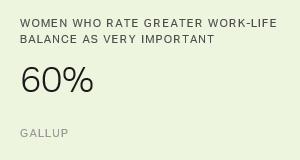Story Highlights
- The majority of women with children prefer homemaking role
- Women without children would rather be employed
- Men prefer employment regardless of their parenting status
PRINCETON, N.J. -- Having young children at home greatly influences whether women in the U.S. prefer to stay at home or work outside of it. More than half of women, 56%, who have a child younger than 18 would ideally like to stay home and care for their house and family, while 58% of those without young children would rather work outside the home. Having young children makes little difference in men's preferences, with close to three-quarters preferring to work regardless of their parenting status.
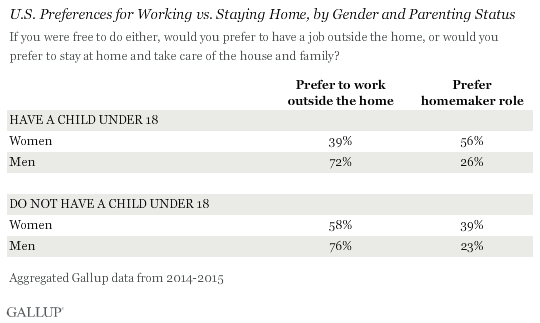
These findings are based on combined data from Gallup's 2014 and 2015 Work and Education surveys, encompassing enough interviews to examine Americans' views on the basis of child and employment status for men and women.
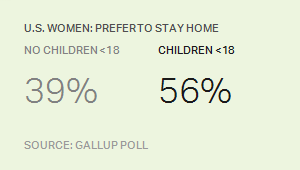
The data show remarkably little difference in the preferences of working versus stay-at-home mothers. Among mothers who are currently employed either full or part time, 40% say they would prefer to work outside the home, and 54% would prefer to stay home. The figures are almost identical among mothers who aren't currently employed: 37% would prefer a job outside the home, while 57% would rather be at home. Meanwhile, there is almost no difference in the lifestyle preference of fathers according to their work status. At least 70% of those employed, as well as those not employed, would rather have a job outside the home.
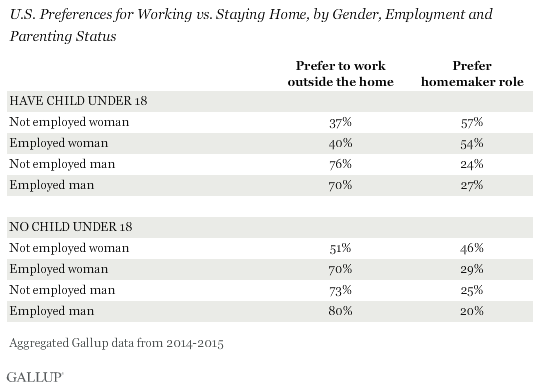
Little Change in Recent Attitudes
Gallup trends show little change in men's and women's overall attitudes in recent years, with slightly more than half of women saying that, given the choice, they would prefer to have a job outside the home, and about 45% saying they would rather stay at home caring for the house and family. However, this is a shift from a decade earlier when preferences were flipped, although they varied some during the late 1990s and early 2000s.
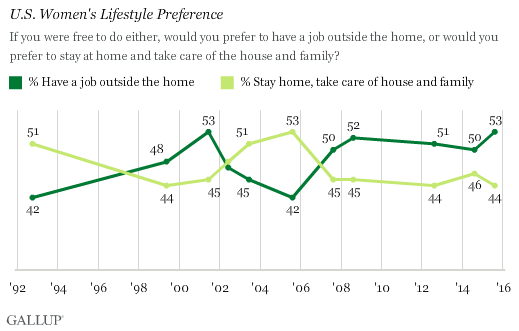
Meanwhile, the large majority of men have shown unwavering preference for working outside the home, generally hovering at just under 75%.
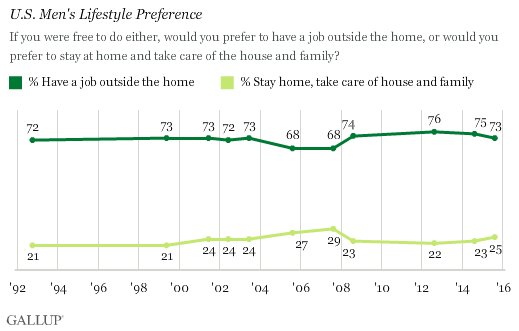
Bottom Line
Having children under the age of 18 is a key factor in whether women would prefer to be employed or stay home, while their current employment status matters relatively little. Among women who don't have young children, employment status makes more of a difference. And for men, neither having a child nor current employment status makes much difference. Men's and women's lifestyle preferences have been fairly stable the past few years, with majorities of both groups overall preferring to work outside the home. While this is consistent with men's views since the early 1990s, women's preference for working outside the home is higher than it was.
Historical data are available in Gallup Analytics.
Survey Methods
Results for this Gallup analysis are based on combined data from the 2014 and 2015 editions of Gallup's annual Work and Education survey, conducted each August. The total sample for the combined data is 2,403 U.S. adults, aged 18 and older, living in all 50 U.S. states and the District of Columbia. This includes 1,059 men and 984 women.
For results based on the total sample of national adults, the margin of sampling error is ±3 percentage points at the 95% confidence level.
For results based on employment and parenting subgroups within men and women, the margins of error are generally between ±4 and ±8. Three subgroups have higher margins of error of ±10 and ±13, but the reported findings still hold even when accounting for this.
Each sample of national adults includes a minimum quota of 50% cellphone respondents and 50% landline respondents, with additional minimum quotas by time zone within region. Landline and cellular telephone numbers are selected using random-digit-dial methods.
View survey methodology, complete question responses and trends.
Learn more about how Gallup Poll Social Series works.
